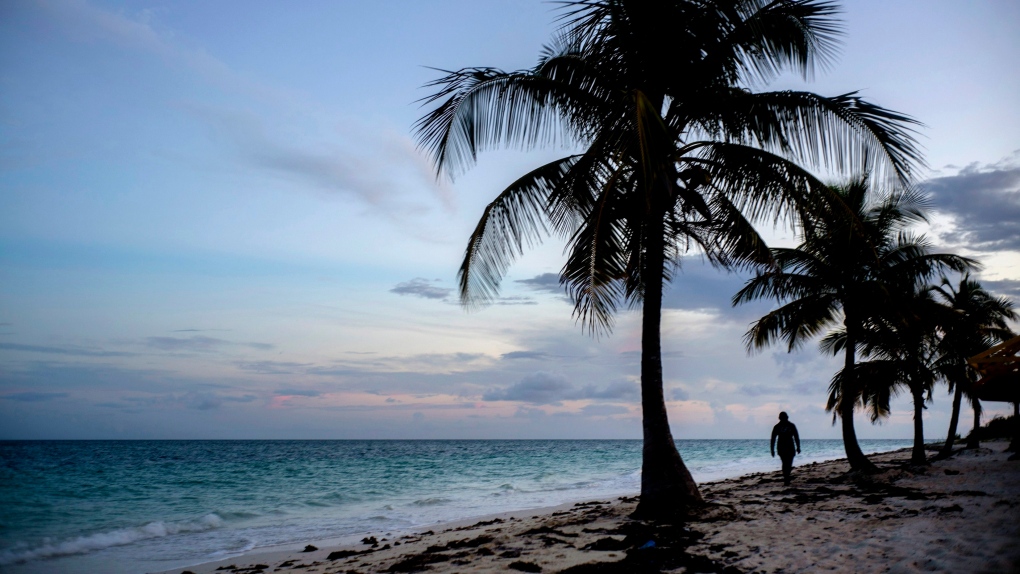
B.C. tenants evicted for landlord's use after refusing large rent increase to take over neighbouring suite
Ashley Dickey and her mother rented part of the same Coquitlam duplex in three different decades under three different landlords.
A shark attacked and killed a U.S. cruise ship passenger who was snorkeling in waters around the Bahamas on Monday, according to authorities.
The incident involved a 58-year-old woman from Pennsylvania and occurred at a popular snorkeling spot near Green Cay in the northern Bahamas, police spokeswoman Chief Superintendent Chrislyn Skippings told The Associated Press.
“It's unfortunate,” she said.
Skippings said the woman's family identified it as a bull shark.
The majority of shark attacks in the Caribbean have occurred in the Bahamas, with two reported in 2019, one of them fatal. That incident involved a Southern California woman who was on vacation and was attacked by three sharks near Rose Island, located just a half mile from where Tuesday's attacked occurred.
In December 2020, a fatal shark attack was reported in the French Caribbean territory of St. Martin, the first such incident in that region.
Overall, at least 32 shark attacks have been reported in the Bahamas since 1749, followed by 13 attacks in Cuba during that time period, including one in 2019, according to the Florida-based International Shark Attack File.
Michael Heithaus, a marine biologist at Florida International University in Miami, said in a phone interview that the high number of attacks in the Bahamas is likely linked to the fact that there are a lot of people in the water in that area and that it has a robust marine ecosystem.
He said the Bahamas has a variety of shark species, the majority of which do not pay attention to people, except for bull sharks and tiger sharks.
“They get to very large sizes, and they eat big prey,” Heithaus said, adding that sharks have incredible sensory systems and can be attracted to food, sounds and smells in the water.
But overall, shark attacks remain rare, he stressed.
Worldwide, there were 137 shark attacks last year, 73 of them unprovoked, according to the International Shark Attack File.

Ashley Dickey and her mother rented part of the same Coquitlam duplex in three different decades under three different landlords.
A man who fell into a crevasse while leading a backcountry ski group deep in the Canadian Rockies has died.
A new survey by Dalhousie University's Agri-Food Analytics Lab asked Canadians about their food consumption habits amid rising prices.
MPP Sarah Jama was asked to leave the Legislative Assembly of Ontario by House Speaker Ted Arnott on Thursday for wearing a keffiyeh, a garment which has been banned at Queen’s Park.
Charlie Woods failed to advance in a U.S. Open local qualifying event Thursday, shooting a 9-over 81 at Legacy Golf & Tennis Club.
As Donald Trump was running for president in 2016, his old friend at the National Enquirer was scooping up potentially damaging stories about the candidate and paying out tens of thousands of dollars to keep them from the public eye.
After Prime Minister Justin Trudeau said the federal government would still send Canada Carbon Rebate cheques to Saskatchewan residents, despite Saskatchewan Premier Scott Moe's decision to stop collecting the carbon tax on natural gas or home heating, questions were raised about whether other provinces would follow suit. CTV News reached out across the country and here's what we found out.
A Montreal actress, who has previously detailed incidents she had with disgraced Hollywood producer Harvey Weinstein, says a New York Court of Appeals decision overturning his 2020 rape conviction is 'discouraging' but not surprising.
Caleb Williams is heading to the Windy City, aiming to become the franchise quarterback Chicago has sought for decades.

Mounties in Nanaimo, B.C., say two late-night revellers are lucky their allegedly drunken antics weren't reported to police after security cameras captured the men trying to steal a heavy sign from a downtown business.
A property tax bill is perplexing a small townhouse community in Fergus, Ont.
When identical twin sisters Kim and Michelle Krezonoski were invited to compete against some of the world’s most elite female runners at last week’s Boston Marathon, they were in disbelief.
The giant stone statues guarding the Lions Gate Bridge have been dressed in custom Vancouver Canucks jerseys as the NHL playoffs get underway.
A local Oilers fan is hoping to see his team cut through the postseason, so he can cut his hair.
A family from Laval, Que. is looking for answers... and their father's body. He died on vacation in Cuba and authorities sent someone else's body back to Canada.
A former educational assistant is calling attention to the rising violence in Alberta's classrooms.
The federal government says its plan to increase taxes on capital gains is aimed at wealthy Canadians to achieve “tax fairness.”
At 6'8" and 350 pounds, there is nothing typical about UBC offensive lineman Giovanni Manu, who was born in Tonga and went to high school in Pitt Meadows.
 This Aug. 31, 2019 file photo shows a woman walking along a beach before the arrival of Hurricane Dorian in Freeport, Grand Bahama, Bahamas. (AP Photo/Ramon Espinosa, File)
This Aug. 31, 2019 file photo shows a woman walking along a beach before the arrival of Hurricane Dorian in Freeport, Grand Bahama, Bahamas. (AP Photo/Ramon Espinosa, File)